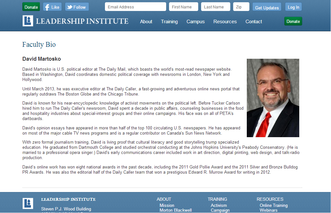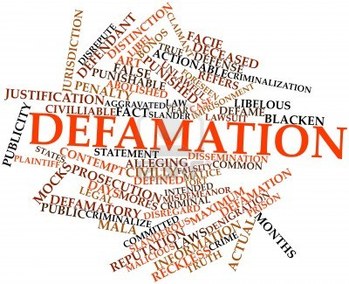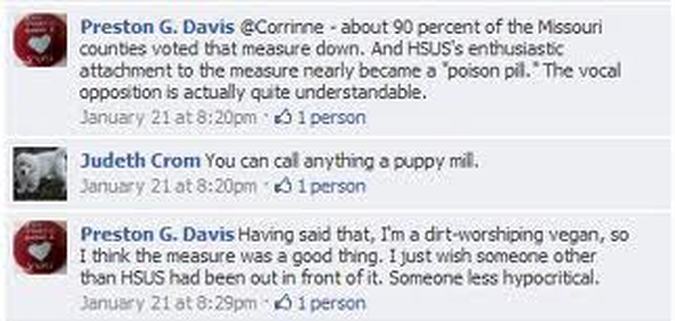How the Center for Consumer Freedom Disseminates the "PETA Kills Animals" Campaign
|
FREQUENTLY ASKED QUESTION #1:
"If the "PETA Kills Animals" phenomenon is a hoax, why are there so many articles and blogs available online indicating that it's true?" ANSWER: Though the Center for Consumer Freedom is a registered "non-profit," over half of its $2.5 million dollar annual revenue is paid to its founder's public relations firm, by way of billed "staffing" and "operating" expenses. The Center for Consumer Freedom is staffed and operated by Rick Berman's public relations firm, Berman and Company, a Washington-based research and communications outfit that prides itself on its media relations savvy. So what do public relations firms do for their clients? According to Forbes, "A good agency or PR practitioner can analyze the organization, find the positive messages and translate those messages into positive media stories. When the news is bad, an agency can formulate the best response and mitigate the damage. An agency is a good listener to the marketplace and knows what conversation starters will work, but also what just might catch fire." |
Public relations firms start conversations, either about their clients or about their clients' adversaries, and they do it by way of writing and distributing press releases and sending "pitches" directly to journalists. Public relations firms cultivate relationships with many different journalists to guarantee their campaigns are received by a broad audience. Since journalists don't actually work for public relations firms, their articles appear to have an unbiased "outsider view," even though, behind the scenes, the journalists are often working closely with public relations groups to disseminate a very specific message.
Public relations firms also specialize in crisis management strategies and develop counter campaigns to mitigate any damage their clients' critics might do to their reputations. By way of its aggressive distribution of "PETA Kills Animals" press releases and its publishing the "PETA Kills Animals" website, the Center for Consumer Freedom effectively acts as both the messenger and the "source" for the disinformation it itself creates.
Public relations firms also specialize in crisis management strategies and develop counter campaigns to mitigate any damage their clients' critics might do to their reputations. By way of its aggressive distribution of "PETA Kills Animals" press releases and its publishing the "PETA Kills Animals" website, the Center for Consumer Freedom effectively acts as both the messenger and the "source" for the disinformation it itself creates.
"I See What You Did There."
|
Effective public relations firms identify where their operatives will have the most influence and they position them there. One the most influential positions a public relations operative can hold is being the Executive Editor of a major online news outlet.
David Martosko, the Center for Consumer Freedom's former Director of Research and the public relations operative who created the "PETA Kills Animals" on behalf of the Center for Consumer Freedom, is the current Executive Editor of the Daily Mail, giving the Center for Consumer Freedom yet another tool with which to bend public debate in a direction that will benefit its clients. |
In a column titled, "The DC’s Top 2012 Stories, Part 2: The ‘Animal Crackers’ Edition," David Martosko features the article, "Documents: PETA Kills More Than 95% of Pets in Its Care," making the following statement: "The documents, obtained from the Virginia Department of Agriculture and Consumer Services, were published online by the Center for Consumer Freedom, a non-profit organization that runs online campaigns targeting groups that antagonize food producers," never disclosing to the Daily Mail readership that it was he who created the "PETA Kills Animals" campaign as the Center for Consumer Freedom's former Director of Research. David Martosko has been frequently cited as a source for the Center for Consumer Freedom's "PETA Kills Animals" material in other online publications and videos , including the Penn and Teller "Bullshit" episode featuring PETA.
|
FREQUENTLY ASKED QUESTION #2:
"Why doesn't PETA just sue their detractors for libel?" ANSWER: What keeps PETA from seeking action against people who make false statements about them is New York Times Co. v. Sullivan, a US Supreme Court case born of the civil rights movement that extends First Amendment protections to those who make false statements about public figures. The caveat being that the statements are not made with "actual malice." When it comes to defamation, the scales of justice tip in favor of private citizens, meaning private citizens are exponentially more likely to recover damages in defamation lawsuits, and less likely to be sued for defamation by public figures. |
"Where the plaintiff in a defamation action is a private citizen who is not in the public eye, the law extends a lesser degree of constitutional protection to defamatory statements. Public figures voluntarily place themselves in a position that invites close scrutiny, whereas private citizens who have not entered public life do not relinquish their interest in protecting their reputation. In addition, public figures have greater access to the means to publicly counteract false statements about them. For these reasons, a private citizen's reputation and privacy interests tend to outweigh free speech considerations and deserve greater protection from the courts. (SeeGertz v. Robert Welch, Inc., 418 U.S. 323, 94 S. Ct. 2997, 41 L. Ed. 2d 789 [1974])."--LawBrain
PETA actively seeks to engage public debate concerning the ethical treatment of animals, so the animal rights group is subject to a heavier burden with regards to proving defamation about the ethics of their own practices. Because PETA actively attracts attention to matters concerning the ethical treatment of animals, PETA's detractors can counter that the public debate surrounding PETA's own shelter practices is the by-catch from a net that the animal rights group itself is casting. It is for the aforementioned reasons that other animal rights organizations have sued David Martosko and the Center for Consumer Freedom and lost.
"Shortly after Thanksgiving 2008, we received an email from the Humane League of Philadelphia purporting to be a--an invitation to a holiday party at which a Vice President of the Humane Society of the United States was scheduled to deliver some sort of keynote address, and given my extensive research background into the animal rights movement, the juxtaposition struck me as rather outrageous and we decided that this specific instance deserved some public comment."--David Martosko
In 2008, in response to the Humane League of Philadelphia's fundraiser announcement, David Martosko took out an ad in the New York Times asking the question, "Why Is the Humane Society of the United States Helping a Terrorist Group Raise Money?" Another part of the ad intimated that Nicholas Cooney, the leader of Humane League of Philadelphia, had "threatened the child of an employee of a pharmaceutical company that works with an animal-testing lab." Martosko claimed that the Humane League of Philadelphia's alleged former association with an animal rights group, one whose members had been imprisoned under the Animal Enterprise Protection Act, had been the impetus for the campaign. A defamation lawsuit resulted from the ad, and because of this litigation, all traces of the ad have disappeared from both the New York Times and Center for Consumer Freedom's websites.
The artifact of Martosko's anti-Humane League campaign still exists however. The Humane League of Philadelphia sued Berman and Company, the Center for Consumer Freedom, Richard Berman, David Martosko, and the New York Times for libel. The New York Times was soon dropped from the lawsuit, but the litigation moved on for the other defendants, at least for a little while. Because of protections afforded them under the First Amendment, the Center for Consumer Freedom and David Martosko ultimately prevailed. However, in a deposition he gave in relation to the Humane League lawsuit, Martosko did reveal details about the shocking lengths he and the Center for Consumer Freedom had gone to to undermine the animal rights movement.
The artifact of Martosko's anti-Humane League campaign still exists however. The Humane League of Philadelphia sued Berman and Company, the Center for Consumer Freedom, Richard Berman, David Martosko, and the New York Times for libel. The New York Times was soon dropped from the lawsuit, but the litigation moved on for the other defendants, at least for a little while. Because of protections afforded them under the First Amendment, the Center for Consumer Freedom and David Martosko ultimately prevailed. However, in a deposition he gave in relation to the Humane League lawsuit, Martosko did reveal details about the shocking lengths he and the Center for Consumer Freedom had gone to to undermine the animal rights movement.
"I'm Telling You, I Think it's Martosko."
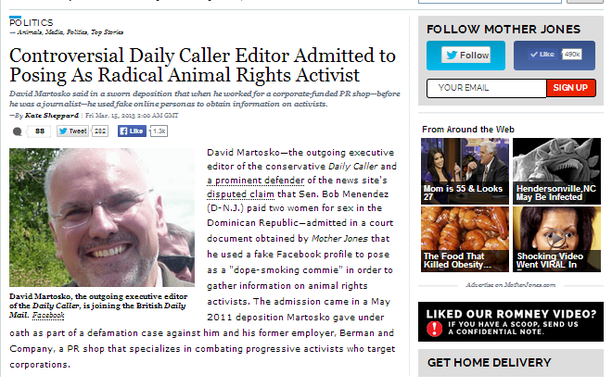
During the Humane League deposition, Martosko revealed that he often posed as an animal rights activist in online forums with the purpose of gathering intelligence on actual animal rights activists, and that his shady activities didn't stop there.
Martosko wouldn't deny that he endeavored to incite activists to commit acts of violence in retaliation for the egregious animal abuse committed against calves at an Ohio organic dairy enterprise. Had Martosko been successful in provoking an attack against the dairy, he would have effectively changed the conversation from one that would potentially effect dairy industry profit margins, to one where animal rights activists were portrayed as the dangerous and violent "terrorists" he often speaks about.
None of the animal rights activists took the bait. In fact, it is believed that it was Martosko's alter ego's efforts to incite violence that tipped actual activists off as to his true intentions and identity. It's been discovered that Martosko used his animal rights activist personas for other unethical activities as well, also on behalf of the Center for Consumer Freedom. As early as 2001, Martosko used this ploy to introduce the Center for Consumer Freedom's deceptive anti-animal propaganda to the animal rights community, hoping his "activist" cache would lend it an air of credibility:
Martosko wouldn't deny that he endeavored to incite activists to commit acts of violence in retaliation for the egregious animal abuse committed against calves at an Ohio organic dairy enterprise. Had Martosko been successful in provoking an attack against the dairy, he would have effectively changed the conversation from one that would potentially effect dairy industry profit margins, to one where animal rights activists were portrayed as the dangerous and violent "terrorists" he often speaks about.
None of the animal rights activists took the bait. In fact, it is believed that it was Martosko's alter ego's efforts to incite violence that tipped actual activists off as to his true intentions and identity. It's been discovered that Martosko used his animal rights activist personas for other unethical activities as well, also on behalf of the Center for Consumer Freedom. As early as 2001, Martosko used this ploy to introduce the Center for Consumer Freedom's deceptive anti-animal propaganda to the animal rights community, hoping his "activist" cache would lend it an air of credibility:
"The Facebook profiles don't appear to be first time Martosko used the Gregory Davis persona online. Mother Jones was able to find comments dating back to 2001 on anarchist and animal rights web forums from a commenter using the email address linked to the Facebook profile. In one instance, Davis posted a USA Today column by Martosko's boss, Richard Berman, and solicited activists' 'thoughts.'"--Mother Jones
"Activists in the animal rights movement have spent decades posing as everything from medical lab workers to farmhands—both online and in person—in order to gather information about their investigative targets. That tactic is their bread and butter. So it should be unremarkable that many researchers would turn the tables on them in order to collect information. Law enforcement infiltrates the violent wing of the movement on a regular basis as well. As the saying goes, what's good for the goose..."--David Martosko
Court Petitions and Cease and Desist Letters Indicate that PETA Takes False Statements Made About Them Very Seriously
The Humane League of Philadelphia's inability to sue David Martosko and the Center for Consumer Freedom for defamation, on the grounds that the League and its founders are considered to be "public figures," illustrates how difficult it would be for PETA, an organization with an infinitely more recognizable brand, to sue them for defamation. During the deposition he gave in conjunction with the Humane League's lawsuit, David Martosko wouldn't deny that he had endeavored to incite animal rights activists to commit acts of violence. Martosko's obvious commitment to undermining the animals rights movement reveals that, with regards to proving "actual malice," animal rights organizations have almost no recourse when it comes to recovering damages from defamation litigation.
PETA does have the option to compel those who make false statements about them to "cease and desist" of their own accord, however. PETA's legal council can contact those who make false statements about them, with letters demonstrating which statements are false, and why they're false, appealing to the offending parties to retract the statements voluntarily.
Appeals of this nature may not outright deter PETA's most dedicated detractors--especially those hired by animal enterprise industries to mitigate PETA's impact on their profit margins--but they may compel them to change the language they use in their attacks. As recently as 2012, the Center for Consumer Freedom outright stated that the animals PETA euthanized at their Norfolk shelter were adoptable, a claim the industry front group is apparently no longer comfortable making. Having been legally apprised that the state of Virginia does not collect data regarding the adoptability of animals taken into custody by Virginia animal shelters, making statements that can be so easily disproved could land the Center for Consumer Freedom in a court battle they wouldn't so easily be able to win. The Center for Consumer Freedom now circumvents the issue by making statements that lead the recipients of their messages to believe that the animals PETA euthanizes are adoptable, without actually saying so. They accomplish this by taking a, "are the animals PETA euthanizes adoptable?: here's why you should think they are," tone when making statements about the animals PETA euthanizes. Examples of some of PETA's endeavors to correct defamatory statements made about them are provided below.
PETA does have the option to compel those who make false statements about them to "cease and desist" of their own accord, however. PETA's legal council can contact those who make false statements about them, with letters demonstrating which statements are false, and why they're false, appealing to the offending parties to retract the statements voluntarily.
Appeals of this nature may not outright deter PETA's most dedicated detractors--especially those hired by animal enterprise industries to mitigate PETA's impact on their profit margins--but they may compel them to change the language they use in their attacks. As recently as 2012, the Center for Consumer Freedom outright stated that the animals PETA euthanized at their Norfolk shelter were adoptable, a claim the industry front group is apparently no longer comfortable making. Having been legally apprised that the state of Virginia does not collect data regarding the adoptability of animals taken into custody by Virginia animal shelters, making statements that can be so easily disproved could land the Center for Consumer Freedom in a court battle they wouldn't so easily be able to win. The Center for Consumer Freedom now circumvents the issue by making statements that lead the recipients of their messages to believe that the animals PETA euthanizes are adoptable, without actually saying so. They accomplish this by taking a, "are the animals PETA euthanizes adoptable?: here's why you should think they are," tone when making statements about the animals PETA euthanizes. Examples of some of PETA's endeavors to correct defamatory statements made about them are provided below.
|
|
|
|
The Money Pipeline Between the Center for Consumer Freedom and Berman and Company Earned the CCF a "Donor Advisory" Rating from Charity Navigator
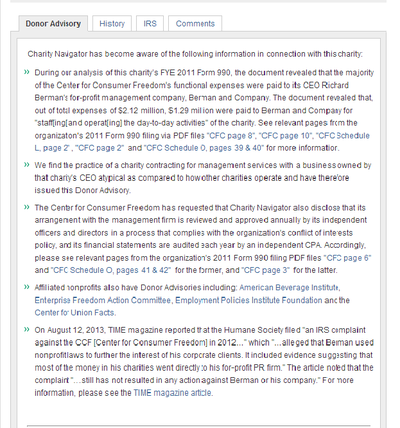 Click on Image to View Entire Document
Click on Image to View Entire Document
"During our analysis of this charity’s FYE 2011 Form 990, the document revealed that the majority of the Center for Consumer Freedom's functional expenses were paid to its CEO Richard Berman's for-profit management company, Berman and Company. The document revealed that, out of total expenses of $2.12 million, $1.29 million were paid to Berman and Company for 'staff[ing[ and operat[ing] the day-to-day activities of the charity."--Charity Navigator

